Table of Contents
Seeing your mom and grandmom fasting on several occasions, you must have also developed the habit of fasting as a part of your occasional routine. But you followed this routine at a time when you were not pregnant. Now that you are an expectant mom, you might want to know whether fasting is safe during pregnancy.
Can You Fast During Your Pregnancy?
Well! A very short answer to this would be “No.” Why? Your energy and nutrient requirements during your pregnancy are high both for you and for the developing baby nurturing inside you. In fact, you need healthy and nutritious food to eat during your pregnancy. So, when you are fasting while pregnant, you will not be able to meet your nutritional requirements. By fasting during pregnancy, you can put your pregnancy through a lot of challenges. It can also affect your developing baby in several ways.
The Risks of Fasting During Pregnancy
As far as fasting while being pregnant is concerned, there are various risks involved.
- According to studies, fasting during the first trimester along with morning sickness is not quite effective. Not eating for quite a long time at this stage, may increase your risk of dehydration, make you feel low in energy, and make you prone to urinary tract infections.
- As you step into the second trimester, your energy requirements are increased by 340 kcal/d. Studies indicate, undernutrition during pregnancy can be linked to promoting weight loss, increased risk of preterm birth, and low birth weight.
- 3% to 8% of pregnant women suffer from diabetes during pregnancy. Studies also show that you must not fast over 12 hours to increase the potential health risks related to diabetes.
- Pregnancy constipation is a common symptom of pregnancy. Fasting while you are pregnant, might just aggravate your chances of constipation.
What Are The Safety Tips For Fasting During Pregnancy?
Fasting for a certain period may not be advisable, but if you still desire to fast on some occasions, here are a few tips that you need to follow:
- Drink a lot of water, and fresh fruit juices to stay hydrated, before and after you are fasting. You can alternatively have soups to give you some energy.
- As a result of fasting, you might feel deprived of food for quite a long time. Try to have food with plenty of fibre including fruits, veggies, and whole grains. But try and avoid fatty or fried or processed food.
- Since there is an increased chance of constipation, you should try to eat in small quantities and quite often.
- Try not to include sugary food in your diet. As there are chances that sugar-coated food might raise your blood sugar level fast. After a sudden shoot-up of your sugar level, if your sugar level drops suddenly, it may make you feel hypo – glycemic or hyper-glycemic
- If you start feeling weak, break your fast immediately
- Plan your whole day in a way so that you can take enough rest
- You can alternatively try out intermittent fasting during pregnancy, in which you can eat a meal in a couple of days or after 8 hours
- Try to avoid stress
- Stay positive
However, if you are still not sure about fasting while you are pregnant, consult your doctor immediately. Along with this if you need any other information on pregnancy, postpartum, and the benefits of cord blood banking follow our blog page.
